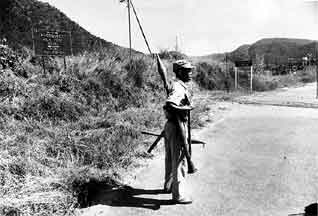1988 Angolan Civil War Partially Halted By Cease Fire

Angolan Troop
A cease-fire went into effect in Angola after an agreement was signed by Angola, Cuba and South Africa. Under the terms of the agreement, Cuba was to withdraw its forces from Angola, and South Africa was to grant Namibia independence and withdraw its forces. Elections were to be held in Angola..
The conflict in Angola was part of the broader Cold War struggle and was intricately linked with the anti-colonial wars in southern Africa. After Angola gained independence from Portugal in 1975, a civil war broke out between the major nationalist movements: the People's Movement for the Liberation of Angola (MPLA), backed by the Soviet Union and Cuba; the National Front for the Liberation of Angola (FNLA), initially supported by the U.S.; and the National Union for the Total Independence of Angola (UNITA), which later received support from the U.S. and South Africa.
Cuba played a significant role in supporting the MPLA government in Angola against UNITA rebels and the intervening South African Defense Force (SADF). At its peak, Cuba had around 50,000 troops in Angola.
South Africa's involvement was twofold: to prevent a Marxist regime from coming to power in Angola, which they believed would threaten their regional hegemony, and to stave off the threat of SWAPO (South West African People's Organization) guerillas operating from Angola into Namibia (then called South West Africa), which was under South African occupation.
After years of proxy warfare, Angola, Cuba, and South Africa signed the Tripartite Accord in New York on December 22, 1988. The agreement's main provisions were:
- Cuban Withdrawal: Cuba agreed to a phased withdrawal of its forces from Angola, to be completed by July 1991.
- Namibian Independence: South Africa agreed to implement UN Security Council Resolution 435, which led to the independence of Namibia. The SADF would withdraw from Angola and Namibia, paving the way for Namibian independence in 1990.
- Elections in Angola: It was decided that free and fair elections would be held in Angola to determine the country's political future. This eventually took place in 1992.
While the Tripartite Accord addressed foreign intervention in Angola and the issue of Namibian independence, it didn't end the civil war in Angola. The MPLA and UNITA continued their struggle for power, leading to a prolonged conflict that lasted until 2002, when Jonas Savimbi, the leader of UNITA, was killed.
The Tripartite Accord is often viewed as a pivotal moment in southern African history, marking the end of direct foreign military interventions in the region and setting the stage for a new political landscape.
 >
>